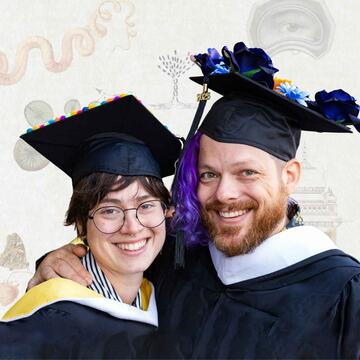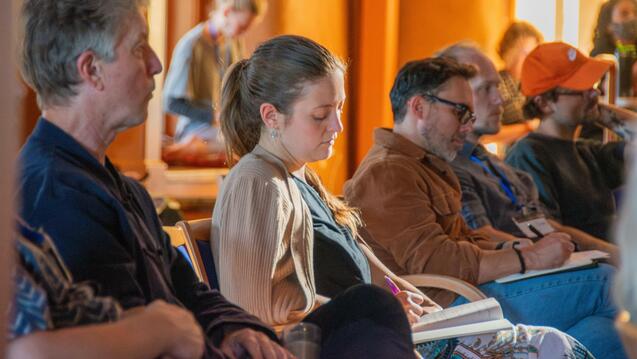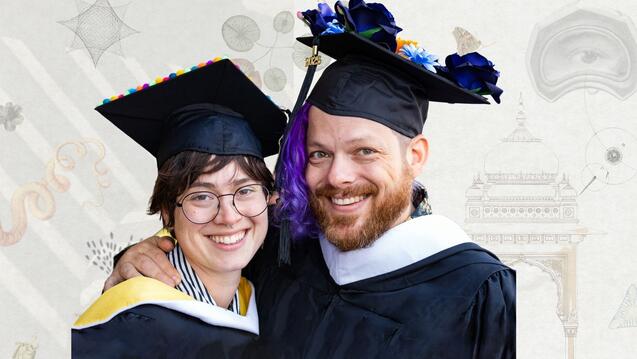
Doctor of Philosophy, Cosmology, and Consciousness
Program Overview
Our Approach
CIIS’ Philosophy, Cosmology, and Consciousness Ph.D. program has been designed to help shape the intellectual, moral, and spiritual leadership necessary for meeting historic global challenges. The crisis of late modernity calls for a fundamental reorientation of our civilization, including a transformation of both our institutions and our own consciousness.
Drawing upon some of the most powerful ideas and impulses of our philosophical, scientific, and religious traditions, the Philosophy, Cosmology, and Consciousness Ph.D. is constructed with an intensive multidisciplinary course of study to help accelerate students' journeys into their leadership roles.
Career Paths
The Ph.D. in Philosophy, Cosmology, and Consciousness is a research doctorate designed to prepare candidates to take leadership roles in addressing key philosophical challenges, questions, and issues of our time. As a transdisciplinary program, our graduates pursue a wide variety of philosophical, ecological, and humanitarian paths, projects, and vocations. Alumni of the program are actively involved in diverse professional areas, such as:
- Teaching, writing, and scholarly publication
- Leading and facilitating programs for cultural, spiritual, and personal transformation
- Creating, producing, and developing new media and engaged arts projects
- Organizing, advocacy, and policy advancement
- Reimagining and renewing a variety of professional fields (e.g., education, religion, medicine, technology, the arts, finance)
Curriculum
The curriculum is offered in both online and in person formats and students may select from the Philosophy, Cosmology, and Consciousness track or the Integral Ecology track. Coursework is customizable with a wide variety of electives available. Upon taking and passing their comprehensive exams, students begin the process of writing their dissertation beginning with the dissertation proposal. After completion, candidates must defend their dissertation before a committee of faculty members.
Online students are highly encouraged, but not required, to participate in the annual residential retreat, intensive courses, and other program-associated events held in and around the San Francisco Bay Area.
Featured Courses
Psyche and Spirit: From the Psychology of Religion to Transpersonal Theory (3 units) This course explores the relation of psyche to “spirit”—that is, to religion, spirituality, and spiritual philosophies and worldviews—through a consideration of the development that leads from classic representatives of the psychology of religion to the principal paradigms of contemporary transpersonal psychology. Readings include primary texts—set in their appropriate contexts—by William James, C.G. Jung, Stanislav Grof, Ken Wilber, Jorge Ferrer, Jenny Wade, and others. Major themes include the evolution of consciousness; connections between main elements of Western spiritual and intellectual traditions and analogues from Asian traditions; and contributions of esotericism, new paradigm science, and non-ordinary experiences to transpersonal theory.
Ecology in a Time of Planetary Crisis (3 units) Ecology is the study of oikos, Greek for “household” or “home.” What does it mean, existentially, to find that our home, Earth, is under threat as a result of human actions? This course provides a broad overview of the human imbrication in planetary systems. We examine critical planetary issues, including climate change, biodiversity loss, deforestation, freshwater depletion, agriculture, fisheries collapse, and globalization, from a holistic perspective. Framing of ecological issues are placed in dialogue with religious and spiritual views, allowing students to discuss the complex interconnected ways that worldviews, biophysical science, institutions, ethics, and justice have shaped the current state of the Earth.
The Colors of American Philosophy: Pluralism, Pragmatism, and Political Transformation (3 units) This course introduces core thinkers and themes in the American philosophical tradition and emphasizes the importance of pluralism, pragmatism, and political transformation. In line with this emphasis, course readings emphasize the influence of Native American, African American, female American, and Latinx thinkers. Course participants will be invited to situate themselves in relation to the themes explored and to present on a relevant text of their choosing that is reflective of their own background. The aim of the course is to provide participants with a conceptual grounding in the diverse histories of American thought in the hope that this grounding is of service to social and political transformation in the present.
-
Minimum 42.2 units of coursework including a dissertation.
I. Required Introduction Course (3 units)
PARP 6060 Introduction to Philosophy, Cosmology, and Consciousness.
( Not required for graduates of the master’s program, who should fulfill this unit requirement with an alternative course.)
II. Philosophy, Cosmology, and Consciousness Electives (18 units)
The following are representative courses. Course options will vary year to year.
PARP 6110 Cosmological Powers
PARP 6120 Cosmology of Literature
PARP 6131 Speculation and Adoration: Introduction to the Study of Medieval Christian Mysticism
PARP 6133 Whitehead’s Adventure in Cosmology: Toward a Physics of the World-Soul
PARP 6134 Process Approaches to Consciousness
PARP 6135 Process and Difference in the Pluriverse
PARP 6142 Archetypal Research: Writing and Methods for the Archetypal Biographer and Historian
PARP 6143 The Red Books of C.G. Jung and J.R.R. Tolkien: An Archetypal Perspective
PARP 6144 Jung on Astrology
PARP 6145 The Way of the Archetypes or Archetypal Astrology and Individuation
PARP 6249 Romanticism and Philosophy
PARP 6275 Plato and Platonism
PARP 6278 Integral Ecologies
PARP 6315 Epic of the Universe
PARP 6393 Mind and Nature in German Idealism
PARP 6403 Spirit and Nature
PARP 6407 Biography and Karma
PARP 6422 Aurobindo, Steiner, and Teilhard
PARP 6431 Martin Luther King Jr.: Justice, Cosmology, and Interconnection
PARP 6506 The Great Turning
PARP 6517 History of Western Thought and Culture: An Archetypal Perspective
PARP 6522 Science, Ecology, and Contested Knowledge(s)
PARP 6525 Toward an Integral Ecological Consciousness
PARP 6532 Christianity and Ecology
PARP 6533 Touch the Earth: Integral Ecology Practicum
PARP 6538 Krishna, Buddha, and Christ
PARP 6563 Buddhism and Ecology
PARP 6650 Advanced Seminar: A.N. Whitehead’s Process and Reality
PARP 6667 Radical Mythospeculation: Cosmic Evolution and Deep History
PARP 6743 Cosmology of Food I
PARP 6744 Cosmology of Food II
PARP 6746 The Earth Journey
PARP 6748 Nature and Eros
PARP 6762 Steiner and Jung
PARP 6822 Hegel, Wilber, and Morin: Foundations of Integral Theory
PARP 6829 Integral T’ai Chi
PARP 6833 The Evolution of Religious Consciousness: From the Paleolithic to the Axial Age
PARP 6834 The Evolution of the Modern Self: From Axial Roots to Postmodern Threshold
PARP 6842 Cosmological Epics
PARP 7001 Psyche and Cosmos I: Transpersonal Psychology and Archetypal Astrology
PARP 7002 Psyche and Cosmos II: Transits in Depth (Practicum)
PARP 7007 American Philosophy
PARP 7008 James Hillman and Archetypal Psychology: An Introduction
PARP 7105 Archetypes, Art, and Culture PARP
7400 Psyche and Spirit: From the Psychology of Religion to Transpersonal Theory
III. General Electives (15 units)
Students choose 15 units from any CIIS program.
IV. Comprehensive Exams (6 units)
PARP 9600 Comprehensive Exam
PARP 9601 Comprehensive Exam
V. Dissertation (0.2 units)
PARP 9800 Dissertation Proposal Completion (three times maximum)
PARP 9900 Dissertation Seminar
-
Minimum 42.2 units of coursework including a dissertation.
I. Required Courses (3 units)
PARP 6060 Introduction to Philosophy, Cosmology, and Consciousness (3 units)
(Not required for graduates of the master’s program.)
II. Philosophy, Cosmology, and Consciousness Electives (18 units)
Students choose 18 units from the Philosophy, Cosmology, and Consciousness Elective elective list.
III. Integral Ecology Electives (9 units)
The following are representative courses. Course options will vary year to year.
PAR 6078 Theory and Method in the Integrative Study of Religion and Ecology
PAR 6079 Ecology in a Time of Planetary Crisis
PAR 6292 Next of Kin
PARP 6110 Cosmological Powers
PARP 6120 Cosmology of Literature
PARP 6150 The Book of Nature
PARP 6159 Plants and People: Understanding the Plant World Through Relationships
PARP 6278 Integral Ecologies
PARP 6315 Epic of the Universe
PARP 6393 Mind and Nature in German Idealism
PARP 6403 Spirit and Nature
PARP 6431 Martin Luther King Jr.: Justice, Cosmology, and Interconnection
PARP 6506 The Great Turning
PARP 6522 Science, Ecology, and Contested Knowledge(s)
PARP 6525 Toward an Integral Ecological Consciousness
PARP 6532 Christianity and Ecology
PARP 6533 Touch the Earth: Integral Ecology Practicum
PARP 6563 Buddhism and Ecology
PARP 6743 Cosmology of Food
PARP 6744 Cosmology of Food II
PARP 6746 The Earth Journey
PARP 6748 Nature and Eros
PARP 6822 Hegel, Wilber, and Morin: Foundations of Integral Theory
IV. General Electives (6 units)
Students choose 6 units from any CIIS program.
V. Comprehensive Exams (6 units)
PARP 9600 Comprehensive Exam
PARP 9601 Comprehensive Exam
VI. Dissertation (0.2 units)
PARP 9800 Dissertation Proposal Completion (three times maximum)
PARP 9900 Dissertation Seminar
Entry Requirements
Students admitted into the doctoral concentration who do not have a master’s from CIIS in Philosophy, Cosmology, and Consciousness may be required to complete up to an additional 18 units of coursework (minus equivalencies) from the core section of the master’s curriculum.
Required Application Materials
Your application is your opportunity to share who you are. To be considered essays and written responses must be your own authentic work.
Online Admissions Application: Begin the application process by submitting an online application and paying the nonrefundable $68 application fee.
Degree Requirement: A bachelor's and master's degree (or the equivalent) from a regionally accredited institution.
Minimum GPA: A GPA of 3.0 or higher in previous coursework is required. However, a GPA below 3.0 does not automatically disqualify an applicant and CIIS will consider a prospective student whose GPA is between 2.0 and 3.0. These individuals are required to submit a GPA Statement and are encouraged to contact our Admissions Team to discuss their options.
Transcripts: Official transcripts from all accredited academic institutions attended where 7 or more credits have been earned. Transcripts may be sent digitally to materials@ciis.edu or mailed to CIIS in their official, sealed envelope. Transcripts from institutions outside the U.S. or Canada require a foreign credit evaluation through World Education Services (WES). CIIS will also accept foreign credential evaluations that are in a comprehensive course-by-course format from the current members of the National Association of Credential Evaluation Services (NACES).
Two Letters of Recommendation: Recommenders should use standard business format and include full contact information-name, email, phone number, and mailing address.
Personal Statement: A four-to-six-page (typed, double-spaced) statement discussing your values, emotional and spiritual insights, aspirations, and life experiences that have led to your decision to apply to this program. Please also address your educational and professional objectives, demonstrating familiarity and alignment with at least one core faculty member's area of expertise.
Research Proposal: In 300-900 words please propose the research project you hope to work on in your doctoral studies. (We understand that your research project might change as you pursue your degree with us.) In addition, identify at least one Philosophy, Cosmology, and Consciousness core faculty member who would be appropriate to serve as a mentor and faculty advisor. Show close familiarity with that faculty member's particular area of expertise. Demonstrate the necessary preparation and motivation for specializing in that area (or areas), especially with respect to research leading to the dissertation.
Academic Writing Sample: A writing sample of eight-to-ten pages (typed, double-spaced) that demonstrates your capacity to think critically and reflectively and demonstrates graduate level writing abilities. A sample that uses outside sources must include proper citations. You may submit copies of previous work, such as a recent academic paper, article, or report that reflects scholarly abilities.
Events and Info Sessions
An Online Overview with Jennifer Gruczelak and Ronda Sharp
A Faculty-Led Info Session with Sean Kelly
Attend our online event on February 21.



Take the Next Step
For over 50 years, CIIS has been at the forefront of education that integrates rigorous science, innovative scholarship, and social justice. You will learn from faculty at the forefront of their fields, local artists and activists, and a community of peers as passionate and dedicated as you. There’s never been a better time to be here – let’s build a healthier and more equitable world.




